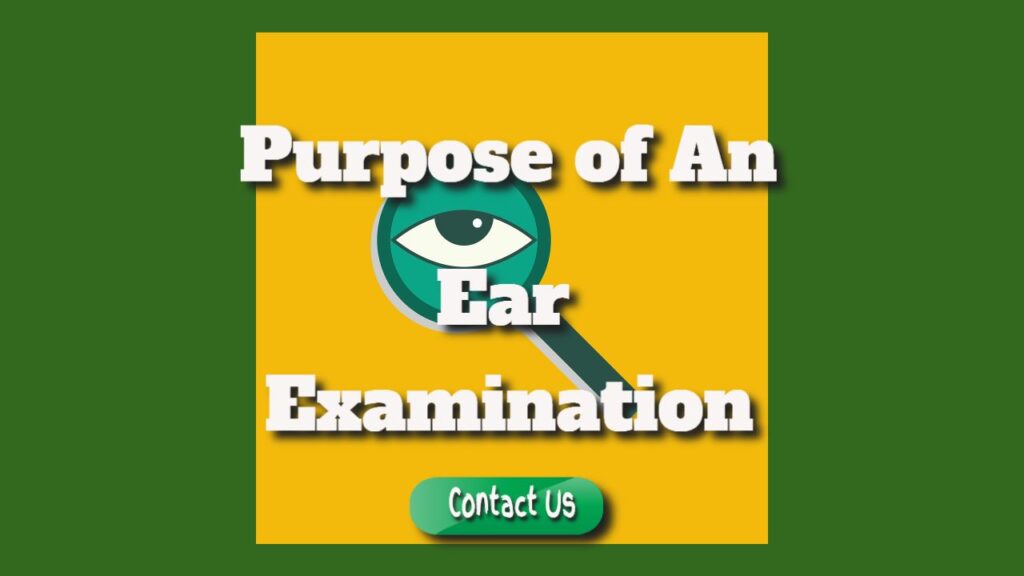What Is The Purpose Of An Ear Examination
What Is The Purpose Of An Ear Examination: You require an ear check for numerous reasons. A standard check-up may include an examination. Your doctor may also recommend it if they suspect an issue with either of your ears, such as if you:
Pain or discomfort in or around the ear, particularly intense or stabbing pain or discomfort that lasts more than a day or two
Plus, discharge or blood is oozing from your ear.
You are concerned that something has been lodged in your ear.
You have hearing problems.
You believe your hearing isn’t as good as it once was.
What takes place during an ear examination?
Your doctor will first inspect your ear from the outside. Then they will look inside using a device known as an otoscope.
This handheld gadget with a light and a magnifying lens allows the doctor to examine the ear canal and eardrum.
A pneumatic otoscope, which has a rubber ball attached to it and blows air into the ear canal, may also be used by your doctor.
This allows your doctor to examine your eardrum and how it moves when there is pressure (air) in your ear canal.
It also helps your doctor see if there’s any fluid behind your eardrum or a problem with the Eustachian tube, which runs from your middle ear to the base of your throat.
When one of the two otoscopes is used, your doctor gently pulls the exterior of your ear back and slightly upwards. This straightens the ear canal, allowing the doctor to insert the otoscope without irritating it.
Ear examinations are usually painless. You may have discomfort if you have a severe ear infection or an ear injury. Your doctor will make every effort to make you as comfortable as possible.
Nonetheless, it would help if you remained still during the ear examination. Sudden movements might cause pain. They may cause ear damage. Is it possible for an ear infection to cause hearing loss?
What you should know about ear infections and hearing loss
Ear infections can affect people of all ages, but they are more common in babies and young children and are frequently connected with a cold, flu, or respiratory infection.
A tiny channel linking the middle ear to the upper respiratory system is known as the Eustachian tube. It is the junction of the ear, nose, and throat.
Because of this connection, bacteria from the nose or sinuses can travel up the Eustachian tube to the middle ear and multiply there.
The Eustachian tube is shorter and thinner in youngsters, making it more easily obstructed by secretions.
Otitis externa, or swimmer’s ear, is another common ear infection that can lead to permanent hearing loss. To put it simply, this is an infection of the external ear canal brought on by swimming with water still in the ear.
Many ear disorders, such as infections, should be treatable by your family doctor.
These are also ENT doctors since they treat ear, nose, and throat problems.
When a hearing test is required
If you last had a hearing test in high school, your doctor may recommend one as part of your ear exam. As an adult, you should get your hearing checked at least once.
There are numerous types of hearing exams. Your doctor or expert will most likely perform numerous of them.
How do I determine if I require hearing aids?
Following discussions take a lot of work.
Having to repeat yourself, particularly in noisy environments
The constant need for a louder TV volume
Feeling lonely
Difficulties comprehending films or performances
The audiologist, according to Lockhart, will most likely:
Discuss your history of hearing loss.
Check your ears for earwax residue.
Use headphones that play noises to test your hearing.

Is earwax a cause of hearing loss?
Using a cotton swab to clean earwax may be dangerous, especially if you are concerned about your hearing.
But if you think earwax is making your hearing loss worse, here’s how to handle the situation carefully, according to experts.
Cerumen, often known as earwax, is a natural substance found in the ear canal that keeps dirt and bacteria at bay. Usually, earwax evaporates and falls out on its own, but in some people, earwax can accumulate and cause hearing loss.
Other earwax symptoms include:
Dizziness
The ear is hurting.
a stuffy sensation
Hearing ringing
Coughing
If an infection is caused by earwax buildup, you may have the following symptoms:
Expulsion from the ear canal
Itching, odour from the ears, and fever
If earwax isn’t taken out correctly, it could hurt the ear and cause permanent hearing loss.
Hearing tests are not painful.
Your doctor or expert may recommend a follow-up test based on the results.
Medication, hearing aids, or surgery may be recommended for hearing loss or other hearing difficulties.
Brought To You By – Ear Wax Removal Edgware
The post What Is The Purpose Of An Ear Examination appeared first on https://gqcentral.co.uk


